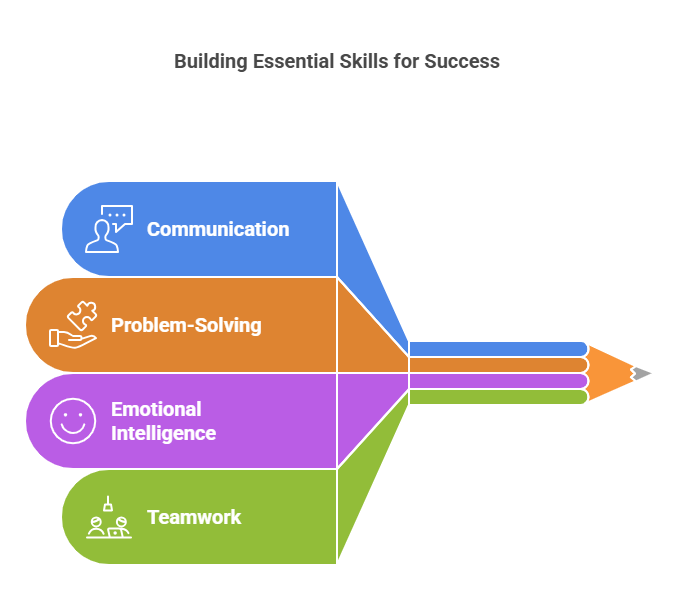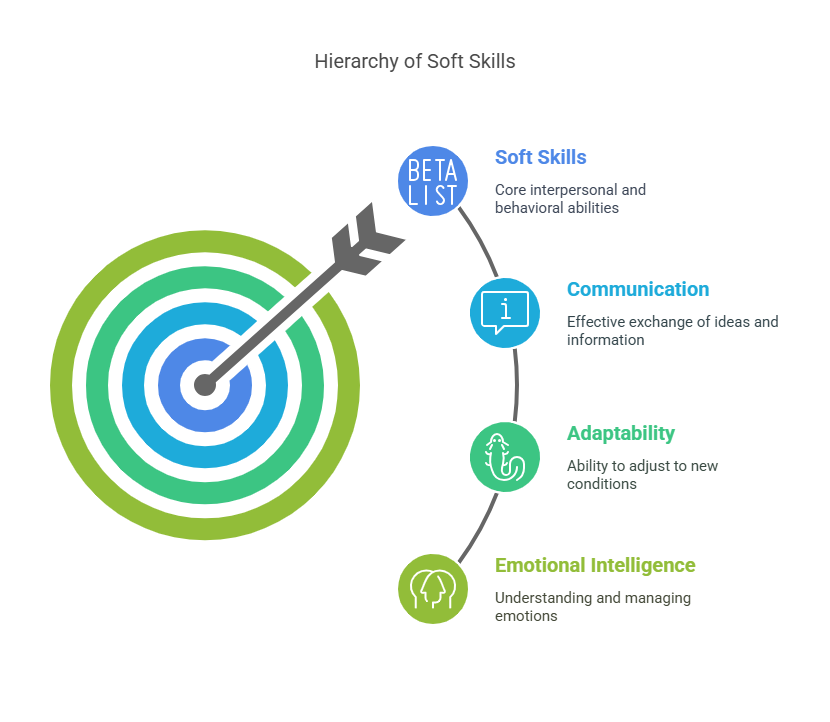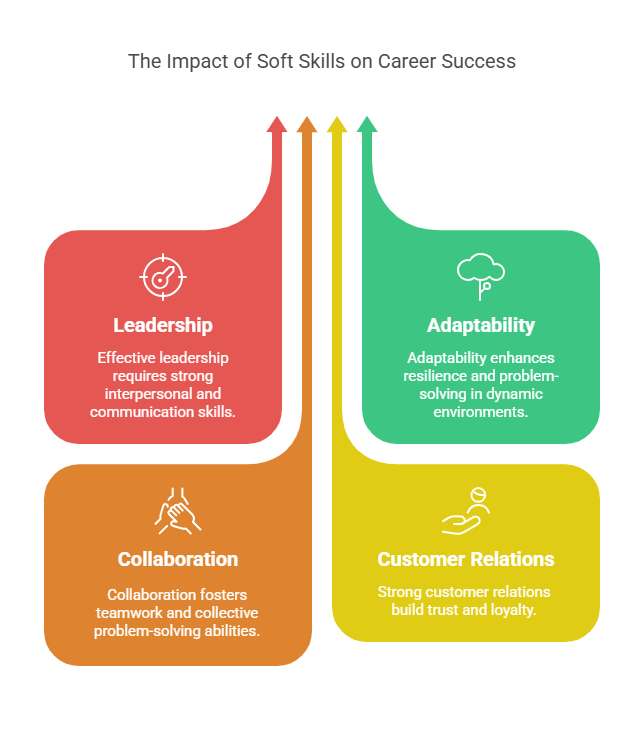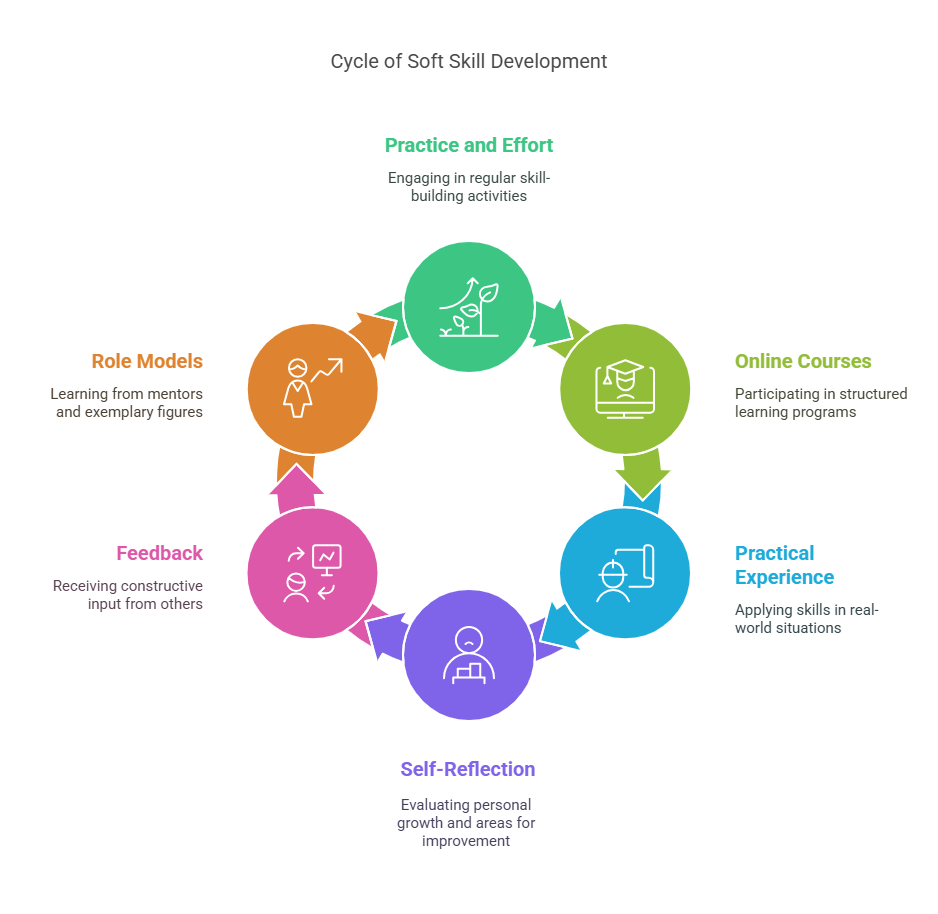In today’s fast-paced world, academic knowledge alone is no longer sufficient to succeed. Instead, soft skills—such as communication, problem-solving, emotional intelligence, and teamwork—have become essential for personal and professional growth. 
While these skills were traditionally overlooked, they are now increasingly recognized as crucial components of a well-rounded education.
Consequently, it’s important to understand why soft skills matter and how they can be nurtured to ensure success in both academic and professional settings.
What Are Soft Skills?

The interpersonal and behavioral skills that determine how individuals interact with others, handle challenges, and adapt to various situations. Unlike hard skills, which are technical and job-specific, soft skills are transferable across careers and industries. Examples include:
- Effective Communication
- Leadership and Teamwork
- Time Management
- Adaptability and Creativity
- Conflict Resolution
- Emotional Intelligence (EQ)
The Role of Soft Skills in Education
It is critical in the classroom and beyond. Here’s why they matter:
- Building Better Relationships
- This help students collaborate effectively with peers and teachers.
- Active listening and empathy foster positive interactions, reducing conflicts and promoting inclusivity.
- Enhancing Academic Performance
- Skills like time management and goal-setting enable students to stay organized and focused on their studies.
- Problem-solving abilities encourage critical thinking, leading to better academic outcomes.
- Preparing for Future Careers
- Employers value candidates with strong communication and teamwork skills as much as technical expertise.
- Students equipped with soft skills are better prepared for interviews, presentations, and workplace dynamics.
- Fostering Emotional Well-Being
- Emotional intelligence helps students manage stress, build resilience, and maintain a positive outlook.
- It also aids in self-awareness, allowing them to understand and regulate their emotions effectively.
Soft Skills in the Professional World

In the workplace, they are often the differentiating factor between equally qualified candidates. Here’s how they impact careers:
- Leadership and Management
- Strong leaders rely on communication, decision-making, and emotional intelligence to inspire and guide teams.
- Adaptability in a Changing World
- With industries evolving rapidly, professionals need to adapt to new technologies, trends, and work environments.
- Collaboration Across Cultures
- In today’s globalized world, cross-cultural communication is essential for working in diverse teams and building international relationships.
- Customer and Client Relations
- Empathy, active listening, and problem-solving are vital for understanding and addressing client needs effectively.
How to Develop Soft Skills

While come naturally, most can be developed with practice and effort. Here’s how:
- In Schools and Colleges
- Group projects, debates, and extracurricular activities like theater or sports enhance teamwork and communication.
- Time management workshops and leadership roles in student organizations build organizational and leadership skills.
- Through Online Courses
- Platforms like Coursera, LinkedIn Learning, and Udemy offer courses on communication, emotional intelligence, and other soft skills.
- Practical Experience
- Volunteering, internships, and part-time jobs provide real-world scenarios to practice soft skills.
- Self-Reflection and Feedback
- Regularly reflecting on one’s behavior and seeking constructive feedback from peers or mentors can accelerate growth.
- Role Models and Mentorship
- Learning from individuals who excel in soft skills can provide valuable insights and inspiration.
Soft Skills for a Digital World
The digital age has introduced new challenges and opportunities for development. Remote work, virtual meetings, and online collaboration require:
- Digital Communication: Mastery of email etiquette, video conferencing, and chat platforms.
- Self-Motivation: The ability to stay productive without constant supervision.
- Adaptability: Embracing new technologies and learning platforms.
The Future of Soft Skills
As artificial intelligence (AI) and automation take over repetitive tasks, human-centric skills like creativity, critical thinking, and emotional intelligence will become even more important. These skills will enable individuals to:
- Innovate in technology-driven industries.
- Lead with empathy in diverse work environments.
- Solve complex problems that machines cannot.
Conclusion
They are the foundation of personal and professional success. By prioritizing their development, individuals can build stronger relationships, excel academically, and thrive in their careers. For educators, parents, and students alike, fostering these skills is an investment in a brighter future.
In a world where change is the only constant, soft skills provide the adaptability, resilience, and emotional intelligence needed to navigate life’s challenges and seize opportunities. As we move forward, let’s ensure that they are an integral part of every education system, empowering the next generation to shine.
Categories
- Blog (82)
- English (2)
- Forex News (1)
- Lessons (1)
- melhores-3 (1)
- Shelly (1)
- Teachers (2)
- test (1)
Latest Posts
Goldene Gewinne locken Navigiere deine m December 25, 2025
Fortune Favors the Bold – Download chi December 25, 2025
Fortune Favors the Bold Master the Chick December 25, 2025
Recent Comments
Archives
Calendar
| M | T | W | T | F | S | S |
|---|---|---|---|---|---|---|
| 1 | ||||||
| 2 | 3 | 4 | 5 | 6 | 7 | 8 |
| 9 | 10 | 11 | 12 | 13 | 14 | 15 |
| 16 | 17 | 18 | 19 | 20 | 21 | 22 |
| 23 | 24 | 25 | 26 | 27 | 28 | 29 |
| 30 | 31 | |||||

